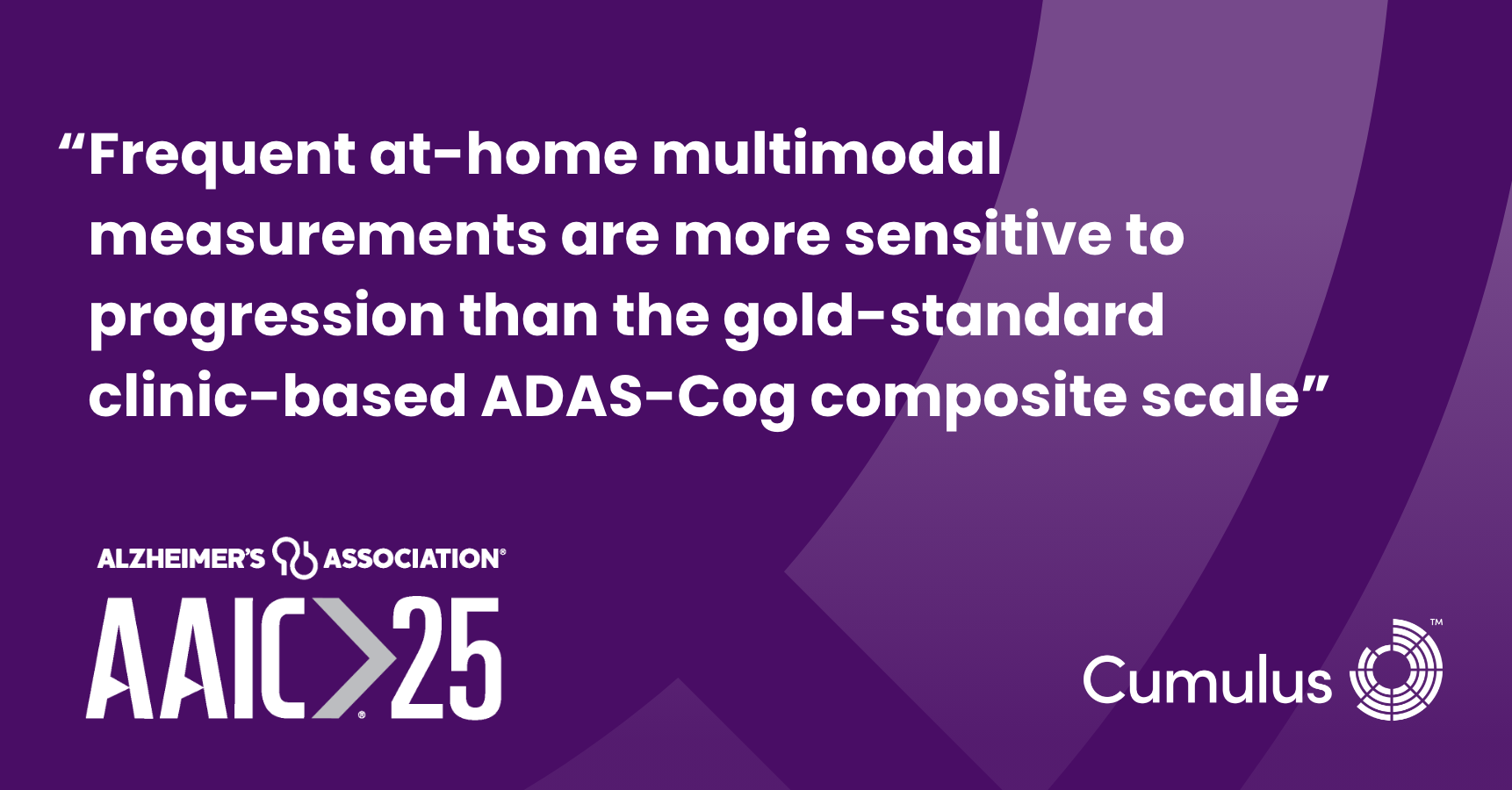First Published: 18th July 2025

Cumulus Neuroscience will present key findings from their CNS-101 study at the Alzheimer’s Association International Conference 2025 in Toronto, Ontario, Canada. The study was conducted in collaboration with the University of Cambridge.
The CNS-101 poster was accepted by the AAIC Scientific Program Committee for presentation at the Technology and Dementia Preconference and the main meeting.
Technology and Dementia Preconference- Title: Frequent at-home multimodal measurements are more sensitive to progression than the gold-standard clinic-based ADAS-Cog composite scale
- Date & Time: Saturday, July 26, 2025: 12:30 - 13:30, 14:40 – 15:00 EST
- Poster Number: 110568
- Session: Technology and Dementia Preconference Posters
- Title: Frequent at-home multimodal measurements are more sensitive to progression than the gold-standard clinic-based ADAS-Cog composite scale
- Date & Time: Tuesday, July 29, 2025: 10:30 – 11:00, 12:15 – 14:00, and 15:30 - 16:15
- Poster Number: 104932
- Session: Biomarkers: Biomarkers (non-neuroimaging)
"Detecting small but meaningful changes in cognition over time is a long-standing challenge in clinical trials. Our validated platform addresses this gap, offering trial sponsors unparalleled sensitivity and frequency of measurement in both home and clinic settings. We look forward to sharing results from our CNS-101 study at AAIC 2025.”
Brian Murphy, PhD
CSO, Cumulus Neuroscience
"Detecting small but meaningful changes in cognition over time is a long-standing challenge in clinical trials," said Brian Murphy, PhD, Co-founder and CSO of Cumulus Neuroscience. "Our validated platform addresses this gap, offering trial sponsors unparalleled sensitivity and frequency of measurement in both home and clinic settings. We look forward to sharing results from our CNS-101 study at AAIC 2025. We are deeply grateful to all the study participants and collaborators who have dedicated their careers to better understanding this devastating neurodegenerative disease with the hope of accelerating the development of much-needed therapies"
In parallel, Cumulus published CNS-103 validation data in the Journal of Internet Medical Research. In CNS-103, four NeuLogiq® Platform digital cognitive assessments, which are novel and repeatable implementations of classic neurobehavioral paradigms, were administered at high frequency following an alcohol challenge to assess sensitivity to change. This study demonstrated the sensitivity and reliability of NeuLogiq® to detect subtle changes in cognitive performance under an acute alcohol challenge.
"Patients, clinicians and clinical trial sponsors need more sensitive and scalable assessments that can be performed at home to make clinical trials more efficient and cost-effective. Validation of new and combined assessments is critical,” said Dr Ruth McKernan, CBE, Chair of Cumulus Neuroscience. "The validation data presented at AAIC 2025 will advance the field’s understanding of the power of sensitive, repeated measurements in Alzheimer’s clinical trials."
Alzheimer's is a progressive disease that affects brain function, memory, and other cognitive abilities. It is the most common cause of dementia, affecting millions of people worldwide. Symptoms usually develop slowly and worsen over time, including memory loss, confusion, difficulty with language and communication, mood swings, and changes in behavior and personality. While there is no known cure, there are currently over one hundred Alzheimer's disease clinical trials underway.
Cumulus supports precision in CNS clinical trials for its industry partners by enabling remote monitoring of patients across multiple domains of brain function. To learn more, visit www.cumulusneuro.com.
ReferenceDyer JF, Barbey FM, Ghoshal A, et al. Temporal Dynamics of Subtle Cognitive Change: Validation of a User Friendly Multidomain Digital Assessment Using an Alcohol Challenge. J Med Internet Res. 2025;27:e55469. doi:10.2196/55469